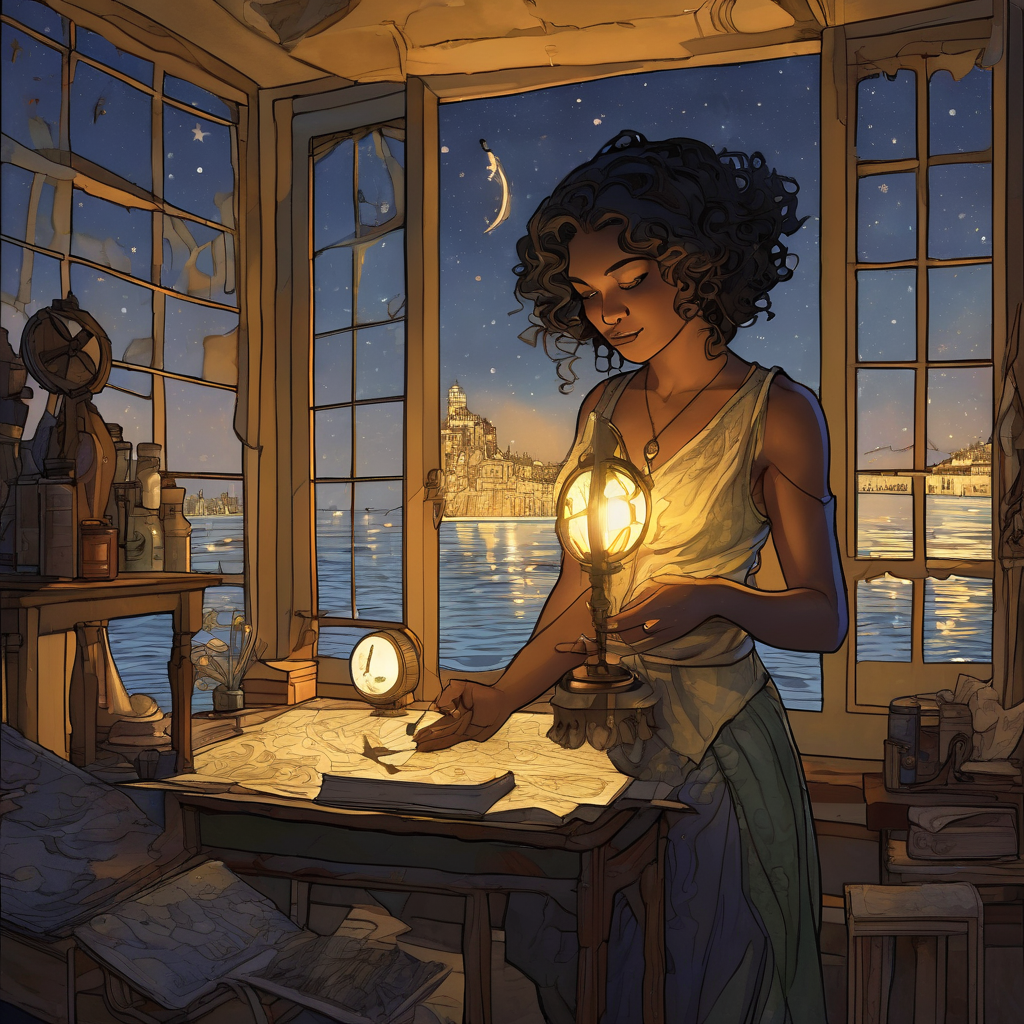Mira’s fingers traced the impossible coastline her father had drawn three days before he vanished. The map showed an island that didn’t exist—not on any chart, not in any atlas—yet here it was, rendered in his meticulous hand with notations in a script that shifted between Arabic and something older, something that made her eyes water when she tried to read it.
The sustainability committee had declared her father’s shop a blight on the gentrified waterfront district. They wanted to replace it with another wellness center, another place where people could practice mindfulness while sipping adaptogenic lattes. But Mira couldn’t leave. Not when the maps had begun to breathe.
It started with the one of the Mediterranean. She’d been cataloging his collections for the estate sale when she noticed the tiny ships moving across the parchment, their sails billowing with invisible wind. Then the map of the Sahara began to shimmer, sand dunes shifting grain by grain across the yellowed paper.
Her father had been more than a cartographer. She understood that now.
The door chimed, though she’d flipped the closed sign hours ago. A woman entered, her hair the color of sea foam, wearing a dress that seemed to be cut from the night sky itself—stars and all.
“You’re Abbas’s daughter,” the woman said. It wasn’t a question. “He was tracking something for us. The boundaries are thinning.”
“Boundaries?”
The woman approached the counter where Mira had spread her father’s final map. “Between what is and what was. Between the world your wellness-obsessed neighbors see and the one your father spent his life documenting.” She touched the edge of the mysterious island. “This is where he went. The Old Cartographers meet there when the boundaries grow too thin, when the forgotten places threaten to resurface.”
Mira watched as the woman’s finger left a trail of silver across the map. “Forgotten places?”
“Cities that chose to step sideways from history. Islands that grew tired of being discovered. Mountains that decided they’d rather be myths.” The woman smiled, and her teeth were like pearls. “Your father wasn’t just mapping geography, child. He was maintaining the treaty between the world that insists on being real and the one that prefers to remain possible.”
The map began to fold itself, corners tucking inward in an origami pattern Mira had never seen. When it finished, it had become a compass rose that pulsed with soft light.
“The committee wants to tear this place down next week,” Mira said.
“Then you’d better hurry. The island appears only when cartographers’ daughters carry their fathers’ last maps across the threshold. It’s been that way since Ptolemy’s girl first noticed the stars were spelled wrong.”
Mira picked up the compass rose. It was warm, like skin. “What if I choose not to go?”
“Then the boundaries continue to thin. The sustainable cities your generation builds will have to account for dragons in their carbon offset calculations. Your mindfulness apps will start showing people their past lives without warning. The world will become more interesting, but infinitely more dangerous.”
Outside, she could hear the late-night joggers, the distant music from the wine bar that served only natural wines and played only vinyl. Her normal world, her predictable world.
“My father left three months of rent paid,” Mira said. “That’s all the time I have.”
“Time moves differently where we’re going. Your father learned that from the Venetian cartographers who mapped the city that exists in the six minutes between midnight and midnight.”
Mira looked around the shop—at the globes that showed continents that had never been, at the atlases written in languages that had never evolved, at the survey equipment that measured distances between dreams.
“Will I be able to come back?”
The woman’s smile was sad and ancient. “Every cartographer asks that question. Your father asked it. His father before him. The answer is always the same: you can come back, but you can never come all the way back. Part of you will always remain there, making sure the maps stay true, keeping the forgotten places from overwhelming the remembered ones.”
Mira thought of her life here—her remote job doing social media for a company that made biodegradable phone cases, her Thursday night book club, her attempts at sourdough that never quite rose properly. She thought of her father, somewhere on an impossible island, doing impossible work.
The compass rose grew warmer in her hand.
“The boundary is thinnest at dawn,” the woman said. “Meet me at the old pier. Bring only what you can carry in your heart.”
After the woman left, Mira stood alone among her father’s maps. Each one now showed signs of movement—rivers flowing, forests growing, cities pulsing with lights that had been extinguished centuries ago. The world was so much larger than anyone knew, so much stranger than any influencer’s curated feed could capture.
She locked the door and walked home through streets that already looked different, as if she were seeing them from the other side of a very old map.

Leave a Reply